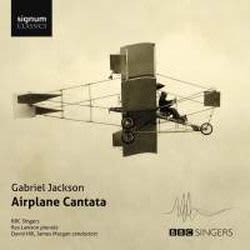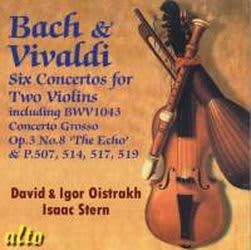Περιγραφή
Καλλιτέχνες
|
The BBC Singers continue their series of releases featuring works by their official Associate Composer – a unique chance for some of the most talented artists to create compositions for the ensemble – with a new collection of world premiere recordings of works by British composer Gabriel Jackson. The central work of the programme – Airplane Cantata – explores the early days of aviation through the journals, news reports and accounts that surrounded this world- changing era. Featuring characteristically precise performances from the BBC Singers, they are joined on this disc by the world-renowned pianola player Rex Lawson. Rex Lawson has an Old Testament look about him, and one of the longest beards in photographic history. His pianola contribution to Gabriel Jackson’s Airplane Cantata does much to create the illusion that the piece is swirling vertiginously in the ether, especially in the, loop-the-looping ‘Flight’ movement. The piece is fun, for sure, if text-heavy, and I’m not sure the voice-over section is totally convincing. The BBC Singers work their usual wonders in making anything you throw at them sound confident and fully assimilated. Tenor Stephen Jeffes’s virtuoso arabesquerie in ‘Overture: Icarus’ deserves special mention. The Choral Symphony is more varied in tone, and structurally more ambitious. Its subject is nothing less than London itself, depicted by 13 texts arranged into four separate movements. The demands placed on the choir are eye-watering, and occasionally there’s a suspicion that Jackson spins notes dazzlingly simply because he’s able to, and because he likes to see them spinning. The performance, conducted by David Hill, is again wonderfully resourceful and committed. Of the shorter works the jagged, expressionistic outcrops of Winter Heavens are specially interesting. All but one work here is a premiere recording. Recording & Performance – 4 STARS Terry Blain, BBC Music Magazine With this impressive disc of works by Gabriel Jackson, the BBC Singers continue their series of releases showcasing music by their former associate composer. Jackson served in this role from 2010-13: judging by the works recorded here, it was an especially fruitful relationship. All but The Voice of the Bard, a setting of Blake whose ecstatic qualities are reminiscent of the opulence of Tippett, are world premiere recordings. The main piece is the Airplane Cantata, an ambitious 20-minute work in which Jackson gives voice to his fascination with flight. Using an anthology of texts beginning with a 16th-century poem about Icarus, Airplane Cantata employs the pianola as accompanying instrument (brilliantly played by Rex Lawson), an appropriate choice as its popularity is roughly contemporary with the early days of manned flight. It also gives the musical impression of a flying machine. Choral Symphony of 2012 was the climax of Jackson’s tenure as associate composer. It is a four-movement homage to the city of London and, by implication, to the BBC Singers themselves. The BBC Singers, celebrating their 90th anniversary this year, are in splendid form throughout. Anyone wanting to test the state of contemporary choral music and its performance need look no further than this CD – it’s a hugely enjoyable and rewarding experience. Choir and Organ I think it would not be an exaggeration to describe Gabriel Jackson as a ‘hot property’ when it comes to choral music – though he has composed in other genres too. His choral music is widely performed and well represented on CD. In addition to individual works that have been included in mixed programmes, if you search under his name on MusicWeb International you’ll find that we have reviewed several previous discs devoted exclusively to his choral music. These have been collections consisting either entirely or mainly of sacred music. That makes this new CD all the more welcome since the music that the BBC Singers have selected is secular in nature. With the exception of The Voice of the Bard – the only one of these pieces that has been recorded before – the music on this CD was composed by Jackson for the BBC Singers when he was their Associate Composer (2010-13). In fact he wrote no fewer than eight works for them during this period. We owe The Voice of the Bard to the BBC also because the Corporation commissioned it for the BBC Radio 3 Choir of the Year 2006, Chantage and their conductor James Davey. They gave its first performance at the British Composer Awards in London in December 2007. It’s the only piece on this programme that I’ve heard before; it was included on a fine Jackson disc by the State Choir Latvija that came to me for review a little while ago. It’s a setting of William Blake and the text inspired Jackson to write music the tone of which is ecstatic and exciting, even in slower, quieter passages. Ruchill Linn sets a poem by the Scottish poet, Robin Bell, describing a scene in his native Perthshire. The word ‘linn’ is a Scottish dialect word for ‘waterfall’ and there are also images of a curlew in the poem. Jackson’s liquid, overlapping textures suggest the waterfall very acutely and his seemingly ever-moving, intertwining vocal lines evoke both birds in flight and running water. Winter Heavens is a setting of lines by George Meredith. The text is complex and perhaps that’s why I found it harder to come to terms with this piece despite the interest of the music itself. There are two substantial works on the disc. Airplane Cantata was stimulated by Gabriel Jackson’s fascination with aviation. Here he draws his tests from a variety of sources and weaves them into a seven-section work of which the fifth is a short instrumental piece. The instrument in question is a pianola, here played with great virtuosity by Rex Lawson. The subject of the cantata is the early history of flight up to the late 1930s, though some of the chosen texts were penned long before man took to the skies. I’m not sure how well this piece works, though the music is full of interest. The often-busy pianola part may not be to all tastes. I wonder if Jackson chose it because its sound might be suggestive of the clatter of an early aero engine. If so, the idea works well in the third section, ‘Flight’ where the women’s voices have long, soaring lines underpinned by an incessantly active pianola part. If the intention was to suggest the freedom of flight but that we rely on mechanical means to achieve that flying freedom then the effect works very well indeed. Elsewhere the pianola part is sometimes a distraction. There are also aspects of the text selection and setting which I find less than wholly convincing. In the second section, ‘Take-off’ the choir sings a contemporary newspaper account of the first flight by the Wright brothers. I’m not entirely sure that this prose is a good choice for singing though what does work well is the mounting excitement in the music as the words describe the take-off and the primitive plane breaking free of the ground. Later, in the penultimate section the choir sings quietly a perceptively prophetic text by Sir George Cayley (1773-1857) in which he expresses confidence that one day man will take to the skies. Over this a speaker (Charles Gibbs) reads a series of facts about aviation between 1911 and the late 1930s. The trouble is – for me – that his words obscure the choral element too much. However, the concluding section, ‘Chorale-Coda’ is much better. Here the choir sings Whitman-esque words by Hart Crane (1899-1932). Their music is in block chords, decorated by the pianola, and it rises to an ecstatic climax before dying away to a hushed close. Airplane Cantata is an interesting work but I’m unsure it will last the test of time, unlike many other Jackson choral works that I’ve heard. The Choral Symphony is quite another matter. This is a work that I’m sure has ‘legs’ though it will remain, I suspect, the preserve of virtuoso ensembles for it sounds to me as if the score makes prodigious demands on the choir. Written as the climax to Jackson’s association with the BBC Singers, I carelessly missed the broadcast of the first performance in October 2012 while the BBC Singers were on tour in Denmark. I’m delighted to catch up with it now in this excellent recording. The work is a celebration of London and Jackson has drawn on a wide variety of sources for his four-movement work. All but one of the thirteen texts is in English – the exception is a brief contribution from the Roma poet, Tacitus. The texts range from the sixteenth century to the present day. Like everything else on the disc, except Airplane Cantata the choir is unaccompanied and there are several solos, all sung by members of the choir. Prodigious virtuosity is required in the first movement, not least in terms of articulating the rhythmic vitality of the music. The second movement, which is the longest, is nocturne-like and contains a lot of very atmospheric and beautiful writing for voices. The scherzo sets a vigorously contemporary poem by George the Poet (b. 1991). The music is very fast and energetic and the choir is required to speak as well as sing. The precision of the BBC Singers is amazing. The final movement sets four more texts plus the few words by Tacitus. Though the music is fascinating I had a sense that this movement is a bit disjointed compared to the others. Nonetheless, this Choral Symphony is an important work and its first recording is a conspicuous success. Throughout this exciting and demanding programme the BBC Singers perform with the virtuosity which we’re accustomed to hearing from them. They’re under the assured direction of David Hill except for the Airplane Cantata, for which James Morgan is at the controls. Gabriel Jackson’s music receives splendid advocacy here and this disc will be a mandatory purchase for all his admirers, especially as all the pieces, with the exception of The Voice of the Bard, are appearing on disc for the first time. John Quinn, Musicweb International Stockhausen’s infamous Helicopter Quartet, for string quartet and four helicopters, has become a symbol of the bizarre extremes of modern musical experimentalism. No doubt to the relief of all concerned, in his fixed-wing ode to aviation, the Airplane Cantata, Gabriel Jackson keeps the feet of the BBC Singers strictly on terra firma, thereby avoiding technical complexity of one kind at least. Jackson’s love of aeronautics has inspired several of his compositions, but the Airplane Cantata is his largest treatment of the theme to date. Opening with a cautionary tale of ambition thwarted, the ill-fated Icarus is a discouraging start to a celebration of flight, but his tale ignites the dream, the realization of which is the subject of the rest of the work. Jackson assembles texts by pioneer aviators and aviatrixes – Orville Wright, Louis Blériot, Amelia Earhart – into a narrative on the early years of powered flight up to the end of its golden age, punctuated by reflective poetic texts, that aims to capture some of the wonder and excitement of the pre-jet era. The narrative texts are quite long and often technically descriptive, concerning the nutes and bolts of flying, and they don’t readily lend themselves to musical setting. Jackson often adopts a style of declamatory choral ‘recitative’, all voices moving as one, exaggerating the rhythms of natural speech while approaching its regular speed, enabling large chunks of prose to be delivered economically though not always intelligibly. Coordinating such music en masse is a significant challenge for the singers, who must achieve absolute unanimity in unpredictable situations. Not many choirs would be competent to take it on, let alone to display such precise and finely managed control as the BBC Singers achieve in this recording. The poetic texts elicit a gentler expressive style, but not all the text is sung. One movement features nuggets of aviation trivia delivered as spoken sound bites against a sung background, bringing to mind old-school commentary intoned over flickering newsreels and creating a sense of perspective. The sepia tint that extends to another remarkable aspect of the Airplane Cantata, because this is no less than a period-instrument performance. At first appearance, the accompanying instrument seems to be a conventional piano. But as the music progresses there is the dawning realization that the accompaniment is beginning to surpass the capabilities of even the most digitally able player, soon turning to superhuman feats of precision and range – producing massive whorls and cross-currents of sound – a process that perhaps mirrors the development of powered flight as human effort is increasingly enhanced by machine. Those who think of pianola as merely an automaton may care to think again after hearing the extraordinary finesse of Rex Lawson’s performance. The other main composition on this recording is Jackson’s Choral Symphony, which might as well be named ‘London Symphony’ as the whole work is a celebration of that city. Vaughan Williams captured magnificently the London of a century ago in his eponymous symphony, and if Jackson’s vision of street cries and pea attuned to the frenetic pace of life there today, where more likely encountered are Tube strikes and Boris bikes. Jackson surveys the city’s long history through a series of poetic and other texts from the earliest times to the present day and, much like the city they describe, they are a mixed bag, bringing with them rather a mixed approach to the music too. Perhaps the most unexpected text is that of the third movement, a city sketch by George the Poet, a young rapper whose smart observations from the streets of the East End are weirdly affected by their transplantation to the recording studios of affluent Maida Vale. (Cloth) caps off to the BBC Singers for their valiant but brief hint of Cockney, not to mention their eloquent delivery of such memorable lines as ‘TFL [Transport for London] knows the world is your Oyster’ (one wonders what RVW would have made of that), but removing the text from its original medium damages its authenticity, and Jackson’s clever rhythms and vocal techniques are no match for the subtle rhyme schemes exposed by the gentle lilt of the rapper. Find George online (or, if you’re feeling authentic, have a butcher’s) to hear how it should be done. The three shorter compositions focus on particular aspects of Jackson’s music. The stark declamation of The Voice of the Bard suggests an orthodox call to worship, and both Ruehill Linn and Winter Heavens depict nature in lyrical mode, with softening tinges of English romanticism. However, all the music recorded here, and the performances too, have both complexity and lightness, seriousness and humour, and this helps make the disc rewarding to listen to. The recording is excellently produced and the booklet contains full information and complete texts, the latter essential to follow while listening. The BBC Singers perform with characteristic accuracy and impressive attention to nuance. From highly ornamental, melismatic solo lines to challenging multi-layered polyphone, nothing seems to faze them, and this disc is a fine acknowledgement of a very productive relationship between the choir and its former associate composer. International Record Review, Peter Lynan The culmination of three years as Associate Composer for the BBC Singers, Airplane Cantata features the choir’s performances of five pieces, culminating in the lengthy Choral Symphony, a celebration of London through six centuries of texts, from courtly 15th century verse to latterday urban poetry. Three pieces set poems by William Blake, George Meredith and Robin Bell, of which the latter’s Ruchill Linn is the standout, with a haunting soprano evocation of a curlew’s call, and a wonderful tumbling cascade of overlapping lines conveying a waterfall’s “white arc of foam”. The cantata is the latest work reflecting Jackson’s fascination with flying, its nine sections using contemporary accounts of achievements by the Wright Brothers, Bleriot and others. The Independent, August 2014 |









